
A collection of 101 research writing idea prompts.
- Subject:
- English Language Arts
- Material Type:
- Activity/Lab
- Provider:
- E Reading Worksheets
- Author:
- E Reading Worksheets
- Date Added:
- 02/26/2019

A collection of 101 research writing idea prompts.

In this lesson, students will analyze Orwell’s carefully chosen words, details, repetitions, and characterizations in these first few pages, students can construct a strong understanding of some of the key features of this society that will give them a solid framework for comprehending the rest of the novel.

In this CCSS lesson, students will explore this story through text dependent questions, academic vocabulary, and writing assignments.

This resource accompanies our Rethink 8th Grade ELA course. It includes ideas for use, ways to support exceptional children, ways to extend learning, digital resources and tools, tips for supporting English Language Learners and students with visual and hearing impairments. There are also ideas for offline learning.

This parent guide supports parents in helping their child at home with the 8th grade ELA content.
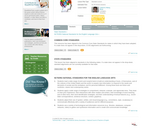
Students will read a text and then they will demonstrate their new vocabulary knowledge through appropriate use of the words in context and with accompanying illustrations. They will create of an ABC book through individual and small-group activities. Students will take an active role in their learning by identifying the content area vocabulary they want to research. This lesson can be implemented in any content classroom.

Students participate in a fishbowl discussion about various legal situations related to the "age of responsibility" and contribute their ideas and arguments on the matter to a Learning Network Student Opinion blog post. This resource from the New York Times discusses what standard(s) society should use to determine when a youth should be treated as an adult.

This teacher's guide for Addie on the Inside by James Howe contains discussion questions, activities, and research assignments.
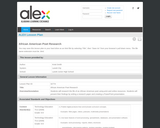
Students will research the life of an African American poet using print and online resources. Afterwards, students present their findings by writing a research paper and creating a PowerPoint presentation.

Students will learn about Princeville, NC, the oldest town in the United States incorporated entirely by African Americans. Students will learn about the challenges that faced newly freed slaves.

A teachers guide for All Creatures Great and Small by James Herriot, including a list of vocabulary words, a set of questions to promote deeper comprehension, prompts for class discussion, and related resources post-read.

In this lesson, students will compare/contrast the information in their textbook about Andrew Jackson to political cartoons of the era. Students will identify symbols, allusions and stereotypes used in these cartoons and infer the intended message and tone of the Jackson era cartoons. Students will also identify any biases in the cartoons and check for historical accuracy, and then formulate their own opinion about the Jackson Administration. As a culminating activity, students will write an opinion essay that articulates their personal stance on Andrew Jackson’s character, using proper writing conventions.
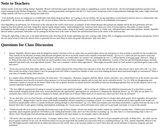
This resource is a collection of discussion questions and to supplement Animal, Vegetable, Miracle by Barbara Kingsolver.
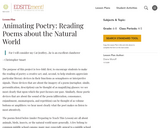
The purpose of this project is two-fold: first, to encourage students to make the reading of poetry a creative act; and, second, to help students appreciate particular literary devices in their functions as semaphores or interpretive signals. Those devices that are about the imagery of a poem (metaphor, simile, personification, description) can be thought of as magnifying glasses: we see most clearly that upon which the poet focuses our gaze. Similarly, those poetic devices that are about the sound of the poem (alliteration, consonance, enjambment, onomatopoeia, and repetition) can be thought of as volume buttons or amplifiers: we hear most clearly what the poet makes us listen to most attentively.

This resource from the New York Times has students explore the play Antigone and a Spanish flamenco dance company's adaptation of the play. The lesson includes activities, graphic organizers and writing assignments.

In this lesson, students will discover a policy within their school or district that is important to them and that they'd like to change. They will conduct an investigation of the policy in question and write a letter with their claim, results, and recommendation to the appropriate audience.

This resource is a collection of discussion questions to supplement The Art of Racing in the Rain by Garth Stein.
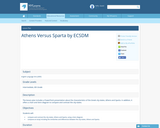
Students will: compare and contrast the city-states, Athens and Sparta, using a Venn diagram. compose an essay including the similarities and differences between the city-states, Athens and Sparta.
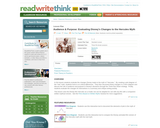
What drives changes to classic myths and fables? In this lesson students evaluate the changes Disney made to the myth of "Hercules" in order to achieve their audience and purpose.
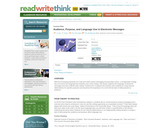
This lesson explores the language of electronic messages and how it affects other writing. Furthermore, it explores the freedom and creativity for using Internet abbreviations for specific purposes and examines the importance of a more formal style of writing based on audience.